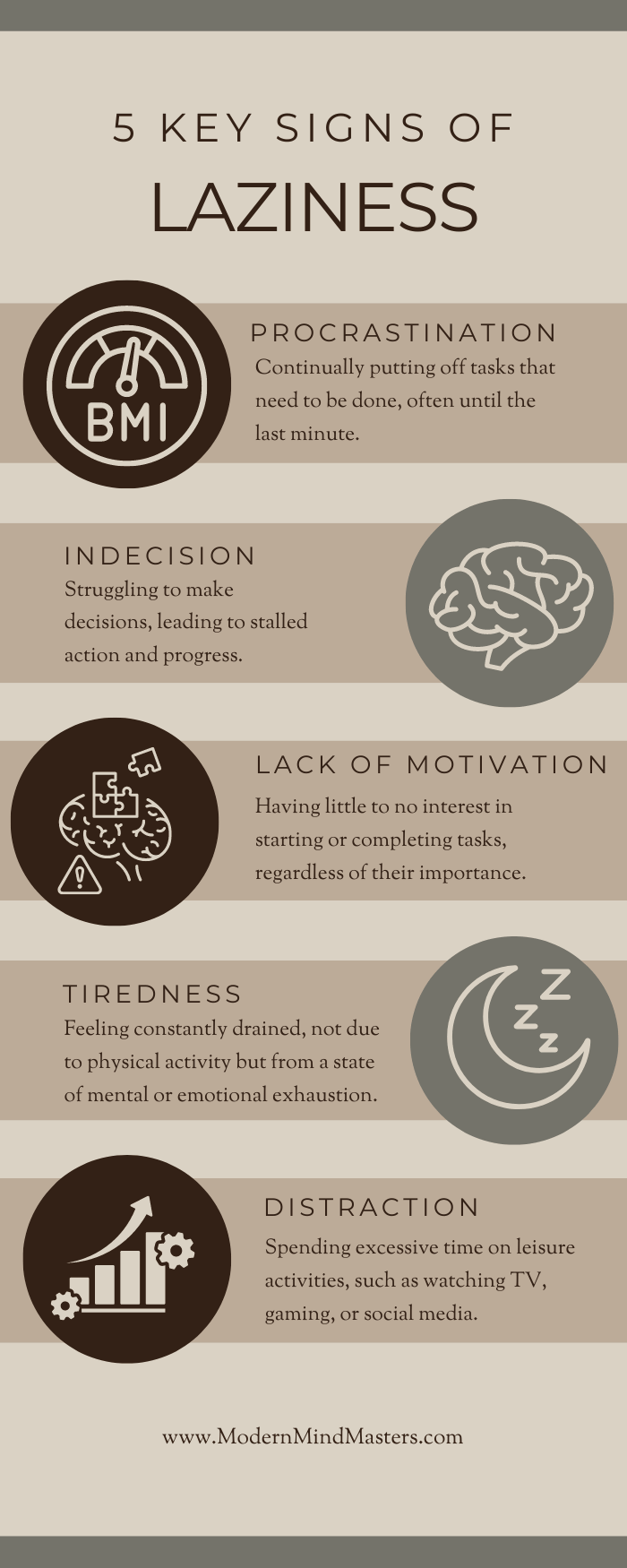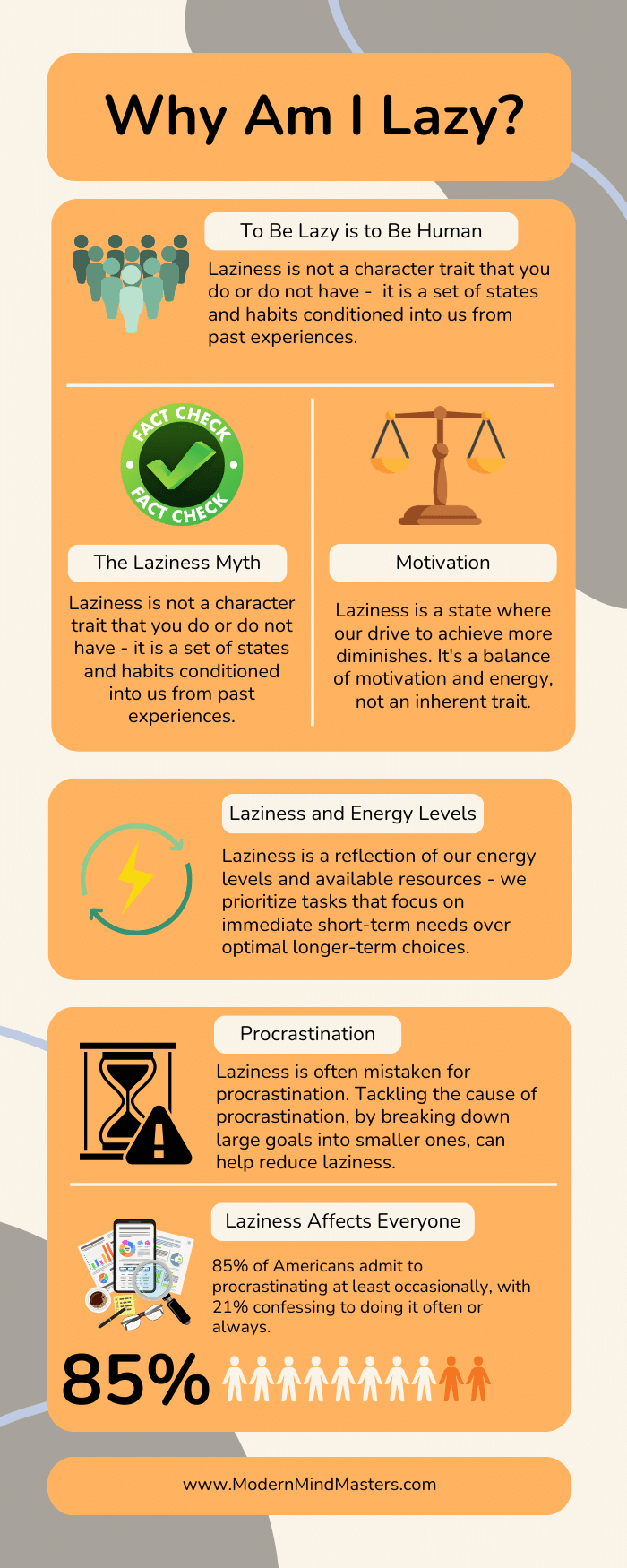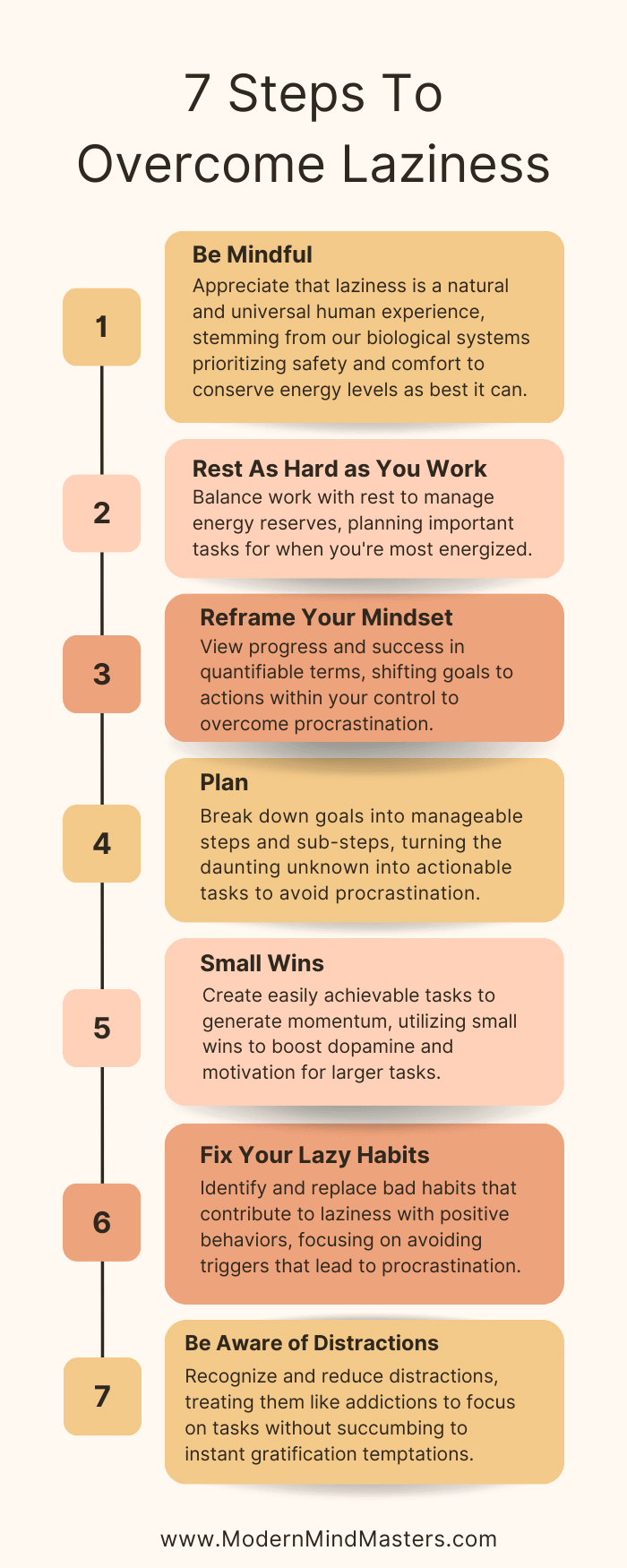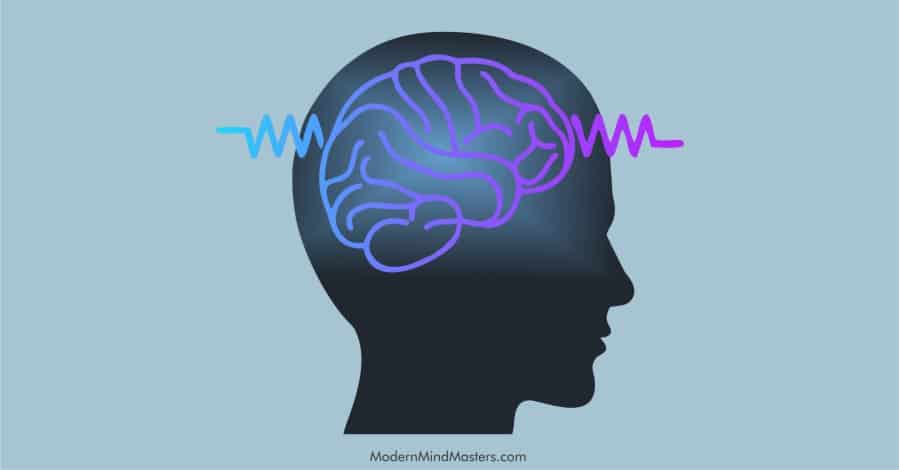How To Overcome Laziness – A 7 Step Guide
Key Points:
- Laziness is not a personal flaw but reflects energy levels and motivation which are situational.
- Laziness indicates a state of satisfied basic needs, allowing rest and energy conservation. Achieving higher goals demands overcoming the this urge for immediate gratification.
- Effective strategies to overcome laziness include being mindful, resting when energy reserves are low, and managing distractions.

Jump to:
In today’s fast-paced world, where even searching for “How to overcome laziness” carries heavy guilt, understanding and overcoming laziness feels more relevant than ever.
Laziness is not a new phenomenon – one of the seven deadly sins is sloth, defined as spiritual or physical laziness – but modern statistics reveal that it is an increasing concern; 46% of GenZs and 38% of Millennials are stressed and exhausted all or most of the time.
This article delves into the depths of laziness, challenging the misconception that laziness is simply our unwillingness to exert effort because we can’t be bothered. Instead, we will question the one-size-fits-all label of laziness, urging a closer examination of its various shades and implications.
Through a blend of personal anecdotes, psychological insights, and expert advice, we embark on a quest not just to “get over” laziness, but to understand its roots and how we can manage it.
Join us as we unravel the complexities of laziness, exploring how it’s intertwined with our motivation, energy levels, and even societal expectations, and discover practical strategies for overcoming this all-too-human experience.
What is Laziness?
While we can all identify laziness – laying in bed, playing games, or endless procrastination on social media are just a few common ones – it is not a clinically recognized term in psychology or medicine. You can’t walk into your doctor’s office and get a diagnosis of “laziness” nor can you get prescribed medicine to make you less lazy (unfortunately).
Its exact definition depends on who you ask; a psychologist might define laziness as a disinclination to activity or exertion despite having the ability to do so, whereas medical literature might relate it to reduced motivation and lethargy – a state of lacking energy.
In the sense that you and I might use it in everyday language, however, laziness usually refers to the tendency to avoid effort or work, characterized by a reluctance to do tasks perceived as demanding or requiring energy, often resulting in procrastination and a lack of motivation.
Some experts even argue that there’s no such thing as laziness and that we live in a society that encourages us to try to do too much in the first place.
Laziness, therefore, is not a trait that one has or does not have but is instead a set of states and habits conditioned into us by past experiences.
What are the Symptoms of Laziness?
Since laziness is not a clinical term or diagnosis, there aren’t any official symptoms.
However, there are common traits that manifest as what we would identify as laziness or those considered lazy.
Procrastination and vacillation (indecision) are the most common traits of laziness, where we delay tasks that we know must be done and struggle to make decisions.
A lack of motivation is another common symptom of laziness, where we face a reluctance or inability to start or complete tasks, stemming from a disinterest in the activity or a failure to see its value.
Laziness is also synonymous with tiredness, which commonly refers to a psychological state of lethargy that discourages effort. This might not necessarily refer to physical exertion or a lack of sleep but mental tiredness, such as being drained after a bad day at work or personal troubles dragging us down.

Is It Normal to be Lazy?
While it might seem sensible to aim for peak productivity— after all, more work should translate to more money and a better lifestyle – laziness has probably always been with us – and likely always will be. In fact, laziness may well be part of what it means to be human.
Before you stop reading and use this as an excuse to start watching television, however, let’s look at how an expert puts it.
Jon M. Jachimowicz, an Assistant Professor at Harvard Business School specializing in Organizational Behavior, proposes that laziness isn’t a fixed characteristic but a reflection of our energy levels and available resources.
Jachimowicz argues that our willingness to exert effort is directly tied to our motivation. Humans prioritize tasks that we deem essential or spark our interest, much like animals in the wild who forage to satisfy their hunger and then subsequently relax, focusing on immediate short-term needs over optimal longer-term choices.
This suggests that laziness might actually signify achievement: having met our basic needs, like food and shelter, we, like our animal counterparts, can afford to rest and conserve energy. After all, isn’t the point of working hard to earn that well-deserved rest?
The problem is, however, that modern humans, with our elevated consciousness, do not just wish to survive – we yearn to thrive.
Achieving this requires willpower to push past our brain’s desire for instant satisfaction, a challenge rooted in our innate tendency toward energy conservation. Our motivation and energy dictate our ability to move beyond this complacency to pursue greater ambitions.
Thus, laziness is not a personal flaw but a state where our drive to achieve more diminishes. It’s a balance of motivation and energy, not an inherent trait.

Is Laziness a Symptom of Depression?
If the thought “Am I lazy or depressed?” has ever crossed your mind, you’re not alone. Both states can present themselves with overlapping symptoms, including a noticeable drop in motivation and interest.
Laziness is often associated as a symptom of depression; however, laziness should not be confused with avolition, a negative symptom of certain mental and neurodevelopmental disorders such as depression, ADHD, sleep disorders, substance use disorders, and even schizophrenia.
ADHD experts point out that trying to do too many things at once can cause trouble with focusing, wanting everything to be perfect, and feeling pessimistic. What looks like laziness might actually be a way to avoid tough situations because of fear of failing or bad outcomes.
Laziness can also lead to not caring about important mental health problems, like feeling angry, stressed, indifferent, using drugs, or being depressed. It’s important to see laziness in the bigger picture, understanding how it connects to our mental health and when it might be a sign of something more serious.
Studies have also indicated that laziness can lead to a lack of concern or indifference towards mental health problems, including anger, anxiety, disinterest, substance abuse, and depression.
How To Overcome Laziness
Since laziness is not a true character trait; it’s not something you’re born with or determined by “lazy” genes that make you more inclined to procrastinate than others, we can put in place tried and tested methods to help you overcome your learned tendencies to procrastinate.
These methods also offer the essential mental clarity needed to define your goals in a way that allows you to gather sufficient mental strength and energy. This way, you can surpass the motivational boundaries imposed by your primitive limbic system, moving from a subconscious mindset of “this is good enough” to a conscious belief that “I can achieve more.”

1) Be Mindful That Laziness Is Natural
Appreciate the fact that laziness is natural to a large degree and that every single human that has ever existed has faced the problem of laziness at some point, no matter how much they achieved.
The alternative to laziness – the relentless engagement in activities without breaks – will cause you to burn out and mentally drain your energy reserves, ultimately leading to failure anyway. Laziness is simply the result of the body and brain trying to manage your finite energy resources.
Be mindful that humans, despite our elevated levels of consciousness and ability, are still at the mercy of primitive biological systems. Our limbic systems still crave the safety and comfort of immediate gratification, explaining why it can be difficult to get off the couch and go to the gym, or refrain from eating that entire box of chocolates.
It is not your fault that you have these lazy cravings; in fact, they are a sign of a healthy limbic system doing what it thinks is best – conserving energy for more immediate threats. Accepting that you are not a lazy person, despite having these “lazy” thoughts, goes a long way in preserving your motivation to overcome them.
2) Rest As Hard as You Work
Since we know motivation is largely dependent on energy – we need a certain level of mental energy to overcome the limbic resistance to do anything above what is required for immediate survival – we need to regulate our energy reserves as best as possible and save them for the tasks that are most important to us.
We all know the feeling of burning out when we try to push our willpower continuously without reprieve. But willpower is a finite resource, limited by our energy reserves.
Taking myself as an example, I have no problem writing for an hour in the morning, when I have a fresh reserve of energy after a full night’s sleep. Trying to write after work, however, having spent my energy working all day, is a no-go. Even if I force myself to sit down and write, the quality takes a serious nosedive.
The takeaway is that you need to rest as hard as you work. The more tired we are, both physically and mentally, the more our mental resources are reduced and the harder it is to expend energy.
When you feel lazy, recognize that your brain is choosing not to engage in a task as fully as it would if resources were not reduced. You may need to retreat from the task and rest to regain energy supplies to tackle the task again when better resourced.
In some cases, being lazy should be equated to taking a break; sometimes we need to take a step back to take two forward.
So give yourself a break, both literally and figuratively, to build up those mental energy reserves. Plan your most important tasks when you have the most energy available, whether first thing in the morning or after your first coffee, whenever works best for you.
And when you feel lazy, be mindful that you have likely already used your energy reserves needed to overcome the motivational hurdle and that you likely need to retreat, recoup your supplies, and try again at a better time.
3) Reframe Your Mindset on Failure and Success
Since procrastination is one of the most damaging consequences of laziness, we need to tackle its root causes.
Procrastination, the act of delaying or postponing tasks or decisions, often despite knowing there might be negative consequences for the delay, is mostly a result of being overwhelmed.
This overwhelm primarily stems from trying to accomplish too much with too little foresight and planning. It took me a year to start this blog, for example, because I kept getting lost in the seemingly endless expanse of knowledge you need to start a website, from domain hosting to SEO research.
Perfectionism frequently gets the best of all of us, so I had to learn to settle for “good enough” – while my website was technically basic, with poor loading times from poor image optimization, I at least had some posts out there. Over time, as I learned a little more every day, everything slowly but surely improved.
The lesson here is that we need to change our view on success and failure. Instead of picturing a fully functional, fast, and popular blog as a sign of success (something that is hard to quantify, track, and measure), I started reframing progress and success in quantifiable terms, such as posting two articles a week. As long as I was sticking to these measurable benchmarks, all other metrics took care of themselves.
Redefine success as making incremental improvements, aiming for a 1% better effort towards your goal, and making those goals certain, such as writing two articles a week, which is in your control, as opposed to achieving 1000 views, which is not.
This approach breaks down overwhelming tasks into manageable steps, making progress feel more achievable and recognizing every small step forward as a victory.
4) Plan For Your Goals
To break down the fog of overwhelm that surrounds your goals, you first need to convert your unknowns into knowns. We do this through planning your goals.
Treat your goals like a recipe; trying to make a cake without knowing the ingredients or steps needed to make it will likely leave you procrastinating and avoiding starting. And if you do manage to summon the vast amount of willpower to perform such a task, the end product won’t be very good.
Instead, make sure you have your step-by-step list ready, and your ingredients. Turn your goals into a series of steps, and keep breaking these steps down into sub-steps until they are sufficiently small enough to tackle immediately without too much thought. After that, it’s just a matter of when not if.
The brain is wired to complete short-term goals, such as foraging for food or shelter, that we can satisfy quickly to fulfill our dopaminergic cravings. The more we can break down our long-term goals into short-term tasks, the easier it will be for our brains to tackle them.
We are not changing the scope of the goal but simply reframing it in a way that the brain can better process it. This is the fundamental process that allows multibillion-dollar construction projects to be turned into reality.
Instead of thinking about reading an entire book, focus on the 20 pages you need to read today. Instead of worrying about losing 10kg, concentrate on preparing a healthy dinner tonight.
The most daunting obstacle to productivity is not doing the work but starting it. Like a boulder at the top of the mountain, getting it moving requires the most energy – gravity does the rest. So make the start point as small and effortless as possible, and momentum will soon take over.
5) Encourage Small Wins
Building upon our planning, we need to create small wins that close the habit loop, tickle our dopaminergic system, and make it more likely for us to complete them in the future.
James Clear, in his influential book “Atomic Habits,” advocates for the one percent rule, suggesting that daily incremental improvements lead to substantial long-term success. These minor achievements provide the momentum necessary to tackle larger challenges, much like gaining the initial push needed to move a heavy boulder.
Similarly, Jordan Peterson, in “12 Rules For Life,” highlights the significance of simple tasks like room cleaning. While seemingly mundane, these tasks are crucial for releasing dopamine, which rewards and motivates us. This principle can be applied to kickstart your day with productivity, creating a domino effect that encourages tackling more substantial tasks.
Starting with small, straightforward tasks not only boosts dopamine levels, making us more inclined to pursue bigger goals but prevents time-wasting activities such as scrolling through social media. This approach underlines the importance of small wins in building a foundation for greater achievements.
Completing small wins early in the day will allow you to ride the dopamine wave released from achieving them. If you are struggling to find the motivation to start work on your essay, clean your room, take out the trash, or do something else that is useful and easily achievable.
With elevated levels of dopamine in your system, you will have a greater motivation to attempt more significant tasks, while building a positive and productive habit early in your day.
It may seem a small and trivial step, but the real value lies in what you are not doing. When making your bed, you are not wasting time looking through social media.
6) Fix Your Bad Habits
Your bad habits might be triggering your procrastination, and hence laziness, by reinforcing patterns of behavior that prioritize immediate comfort or pleasure over long-term goals and productivity.
Bad habits create a cycle of avoidance and procrastination, making it increasingly difficult to direct effort toward tasks that require more energy.
Some of the most common bad habits that facilitate laziness include oversleeping, mobile phone usage such as social media, unhealthy eating habits, and skipping exercise. Identify what bad habits you have that result in you feeling lazy.
After recognizing your bad habits, the next step is to identify what triggers them. Triggers are cues that remind your subconscious mind of a habit, prompting you to act on it without much thought.
For example, for someone who procrastinates, receiving a message notification could lead to an unintended time spent browsing Facebook. Identifying and altering these triggers can help curb your tendency to procrastinate. If your phone is a distraction, try keeping it in another room. If interruptions from family members are the issue, set specific times when you are not to be disturbed.
Procrastination can develop into a hard-to-break habit if your brain becomes accustomed to avoiding uncomfortable tasks. According to Wendy Wood, Ph., a renowned habit researcher and psychology professor at the University of Southern California, habits form from consistently repeating actions that provide immediate pleasure. Procrastination fits this bill by offering a temporary escape from daunting tasks, thereby becoming a self-reinforcing cycle.
See this article here for a full walkthrough of breaking bad habits.
7) Be Aware of Distractions
Studies of motivation suggest that laziness may be caused by a decreased level of motivation which stems in large part from over-stimulation or excessive impulses or distractions.
Modern inventions, from social media to television, have created a near-infinite number of ways to distract us from being productive.
Many modern distractions, especially those that provide instant gratification (like social media, video games, or any engaging digital content), are designed to spike our dopamine systems, where we associate pleasure with receiving likes, comments, or followers.
These little boosts, when performed frequently enough, can turn into addictions. Dopamine plays a significant role in addiction by creating rewarding feelings that the brain seeks to replicate, encouraging repeated engagement with the distraction.
Over time, the preference for distractions can become a habit. The brain’s reward system gets recalibrated to value quick dopamine boosts from distractions over the slower, steadier dopamine release associated with completing necessary but less immediately rewarding tasks.
Removing these distractions is never easy – you are essentially breaking an addiction. But you must be mindful of which distractions might cause you to procrastinate or break your focus, and treat them like bad habits that must be replaced.
Conclusion
Laziness encompasses far more layers than often acknowledged. The term unfortunately carries a connotation that unfairly characterizes individuals as simply unwilling to exert effort, despite their ability to do so.
The tools provided are not about fighting against your nature but working with it. Remember, it’s entirely natural to have moments where you feel like doing anything but the task at hand – it’s our primitive limbic system doing what it knows best; conserving energy.
To overcome laziness, first, permit yourself to acknowledge that feeling lazy is a part of being human. It doesn’t define your worth or your potential. It’s a signal, sometimes indicating that you need to recharge, and other times, a reminder to look closer at what’s really holding you back.
Is it fear, uncertainty, or perhaps a task that feels too big to tackle? Break it down. Make your goals manageable, and celebrate each small victory. These aren’t just steps towards your goal; they’re a testament to your resilience.
Now, think about rest not as a reward for finishing work but as a foundational part of doing great work. Schedule it like you would an important meeting. This isn’t laziness; it’s strategic energy management. Your brain and body will thank you for it.
Reframe how you view success and failure. Let go of the idea that everything has to be perfect from the get-go. Embrace the messiness of the process, the learning that comes from trying, adjusting, and trying again. Remember, every great achievement was once a daunting goal, broken down into smaller, actionable steps.
FAQs
Laziness is not a personal flaw but a state where our drive to achieve more diminishes. It’s a balance of motivation and energy, not an inherent trait.
Laziness isn’t a fixed characteristic but a reflection of our energy levels and available resources.
To overcome laziness, first, permit yourself to acknowledge that feeling lazy is a part of being human. It doesn’t define your worth or your potential. It’s a signal, sometimes indicating that you need to recharge, and other times, a reminder to look closer at what’s really holding you back.

The Neuroscience of Motivation: The Brain’s Role in Achieving Goals
The neuroscience of goals is thought to boil down to three key areas of the brains, which utilize neurotransmitters to increase or decrease our motivation

3 Must-Read Books to Boost Your Social Skills
Humans are unpredictable by nature, so boosting our social skills is one of the strongest weapons we can use for successful communications. Here are 3 of the best books on social skills.

How To Find Inner Peace – A Lifelong Guide
Explore how to find inner peace through removing distractions, making time to embrace silence, and tuning into your emotions through mindfulness.

The 10 Best And Worst Nootropics For Cognitive Performance
Nootropics, also known as smart drugs, are increasing in popularity among healthy individuals looking to increase cognitive performance and function.

Larks and Owls – Why Waking Early May Not Be Best For You
Early risers are praised for their effort and hard work. But science has shown that night owls may be even more productive, as long as they follow their body’s natural schedule.

The Negative Effects Of Increasing Your Dopamine
Higher dopamine levels increase motivation and drive over the short term, but consistent use longer-term will have the opposite effect. Learn the negative effects of increasing your dopamine and how to use it optimally.